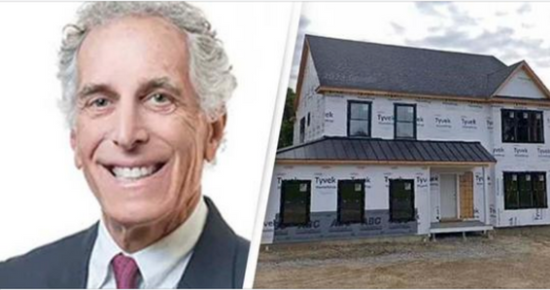In the idyllic landscape of Connecticut’s Sky Top Terrace, a story has unfolded that is as baffling as it is unsettling. Dr. Daniel Kenigsberg, a man with deep-rooted ties to the land, returned to the property he owned for over three decades only to find a grandiose $1.5 million house standing tall, an embodiment of a baffling tale of deception and alleged property theft.1
The Enchanted Land with Dark Secrets
Nestled just outside of New Haven, the half-acre strip at 51 Sky Top Terrace held a significant place in Dr. Kenigsberg’s heart. A parcel he had held since 1991, it was not just a piece of land but a connection to his childhood home purchased by his father in 1953 for a mere $5,000. A spot he hoped to pass on to his own children one day, Dr. Kenigsberg had always nurtured a fondness for the town. He dreamed that if one of his children chose to reside in Fairfield, Connecticut, he would be delighted by the continuation of a generational connection.
However, this cherished connection took an unprecedented twist when Dr. Kenigsberg received a shocking call from a childhood friend. While grappling with the news of his friend’s hospice stay, he was hit with another revelation: a house was being built on his property, unbeknownst to him. “I own that and I never sold it,” he exclaimed, his sense of ownership and security shattered.
The Unfolding Deception
Driven by shock and curiosity, Dr. Kenigsberg journeyed back to Sky Top Terrace to witness the surreal sight with his own eyes. There, standing in stark contrast to the wooded landscape he had watched evolve over decades, was a nearly completed, opulent four-bedroom house. What unfolded next was a complex web of transactions that baffled even the most seasoned legal minds.
Records revealed that his property had been sold to 51 Sky Top Partners LLC for $350,000. However, Dr. Kenigsberg adamantly asserted that he had no involvement in this sale and was completely unaware of its occurrence. The property he had held so dear had fallen victim to a bizarre scam involving alleged identity theft, forgery, and negligent real estate professionals.
Legal Battle and Technological Implications
In his pursuit of justice, Dr. Kenigsberg launched a lawsuit against 51 Sky Top Partners, targeting counts of trespass, statutory theft, and unfair trade practices. The legal battle sought to nullify the sale and claimed damages amounting to $2 million, along with the restoration of his property. On the other side, 51 Sky Top Partners proclaimed their own victimhood, alleging that they had been caught up in a sophisticated scam orchestrated by an impersonator.
This perplexing case brings to light the intricacies of modern property dealings, especially in an era where technology and real estate intersect in unprecedented ways. The rise of artificial intelligence has blurred the lines between authenticity and deception, making instances of identity theft more prevalent.2 As a response to this growing concern, innovative measures like the “fraud alert” service have emerged, allowing property owners to monitor legal activities tied to their assets.
Conclusion
The saga of Dr. Daniel Kenigsberg and the $1.5 million house stands as a stark reminder of the complexities and challenges intertwined within the world of real estate. What initially seemed like an innocent connection to childhood memories turned into a bewildering legal turmoil.
As the legal proceedings unfold and investigations continue, this incident serves as a potent reminder of the vigilance required to uphold the sanctity of property rights in an era where technology’s dual-edged nature can either empower or deceive. In the end, this story is not merely about a house built on stolen land, but a testament to the resilience needed to safeguard property ownership in an ever-evolving landscape.
 Viral Hatch US/UK No.1 News Portal
Viral Hatch US/UK No.1 News Portal







